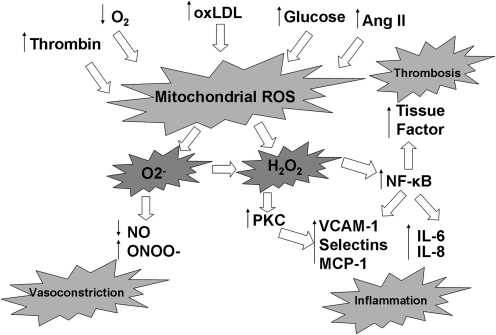FIG. 4.
Endothelial cell mitochondrial ROS response to pathologic stressors. A wide variety of pathologic stressors associated with cardiovascular risk factors are known to increase mitochondrial ROS production, including thrombin, hypoxemia, oxidized LDL, elevated angiotensin II levels, and elevated glucose levels. These have the effect of increasing both superoxide and hydrogen peroxide levels. This results in inactivation of endothelium-derived NO synthase and consumes any NO that is produced, unleashing proinflammatory signaling pathways. The consequence is increased expression of endothelial cell-adhesion molecules (VCAM-1, selectins, MCP-1), inflammatory cytokines (IL-6 and IL-8), and prothrombotic tissue factor.

